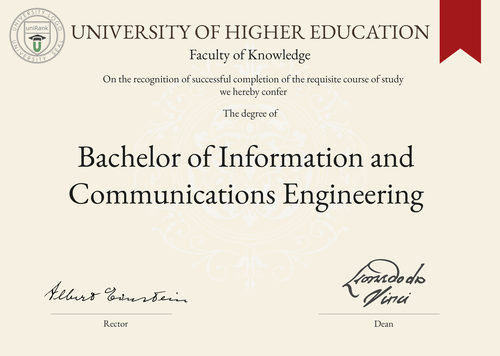
Bachelor of Information and Communications Engineering (BICE)
Guide to University Programs/Courses
Bachelor of Information and Communications Engineering (BICE)

Program/Course Name
Bachelor of Information and Communications EngineeringProgram/Course Abbreviation
BICEDuration Range
The duration of the program typically ranges from 3 to 4 years.Tuition range
The tuition fees for the program can vary depending on the country and university, ranging from [insert range].Overview
The Bachelor of Information and Communications Engineering program is designed to provide students with a comprehensive understanding of the principles and practices in the field of information and communications engineering. This program combines theoretical knowledge with practical skills to prepare students for a successful career in the industry.Curriculum Overview by Year
- Year 1: Introduction to Information and Communications Engineering, Mathematics for Engineers, Programming Fundamentals, Digital Logic Design.- Year 2: Data Structures and Algorithms, Computer Networks, Signals and Systems, Database Systems.- Year 3: Wireless Communications, Internet of Things, Software Engineering, Elective Courses.- Year 4: Advanced Topics in Information and Communications Engineering, Capstone Project, Internship.Key Components
The key components of the program include a strong foundation in mathematics and engineering principles, programming skills, knowledge of computer networks and communications systems and practical experience through internships and a capstone project.Career Prospects
Graduates of the Bachelor of Information and Communications Engineering program can pursue various career paths in industries such as telecommunications, software development, network engineering, data analysis and research and development. They can work as information systems managers, network administrators, software engineers, telecommunications consultants and more.Salary Expectations
The salary expectations for graduates of the program can vary depending on factors such as the country, industry, job role and level of experience. On average, information and communications engineers can expect a competitive salary range. For a more accurate understanding of salary expectations, you can utilize the Job Sites Search Engine, from our sister site jobRank, which searches over 4,600 job sites worldwide. Make sure to specify not only the job title but also the country you are interested in.Conclusions
It is important to note that the duration, tuition fees, curriculum, key components, career prospects and salary expectations of the Bachelor of Information and Communications Engineering program can vary depending on the chosen country or location for studying the program, as well as the chosen university. Visitors interested in pursuing this degree are encouraged to use the uniRank World Universities Search Engine to find universities offering this specific degree program anywhere in the world.World Universities Search Engine
search for Bachelor of Information and Communications Engineering (BICE) and add the Location (country, state etc.) or specific University you are interested in studying at.
Query examples:
- Bachelor of Information and Communications Engineering (BICE) United States
- Bachelor of Information and Communications Engineering (BICE) United Kingdom online
- Bachelor of Information and Communications Engineering (BICE) Australia international students
- Bachelor of Information and Communications Engineering (BICE) University of California
- Bachelor of Information and Communications Engineering (BICE) University of London tuition fees
- Bachelor of Information and Communications Engineering (BICE) University of Sydney scholarships